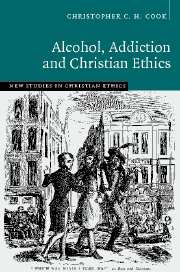Book contents
- Frontmatter
- Contents
- General editor's preface
- Preface
- 1 Alcohol, addiction and Christian ethics: introduction
- 2 An addiction in context: the use, misuse and harmful use of alcohol
- 3 Drunkenness as vice in the New Testament
- 4 Drunkenness as intemperance: Augustine, Aquinas, Luther and Whitefield
- 5 Temperance redefined: the nineteenth-century temperance movement
- 6 Addiction as sin and syndrome: the divided self
- 7 Alcohol, addiction and Christian ethics
- 8 Conclusions
- Bibliography
- Index of Bible references
- Index of names and subjects
5 - Temperance redefined: the nineteenth-century temperance movement
Published online by Cambridge University Press: 22 September 2009
- Frontmatter
- Contents
- General editor's preface
- Preface
- 1 Alcohol, addiction and Christian ethics: introduction
- 2 An addiction in context: the use, misuse and harmful use of alcohol
- 3 Drunkenness as vice in the New Testament
- 4 Drunkenness as intemperance: Augustine, Aquinas, Luther and Whitefield
- 5 Temperance redefined: the nineteenth-century temperance movement
- 6 Addiction as sin and syndrome: the divided self
- 7 Alcohol, addiction and Christian ethics
- 8 Conclusions
- Bibliography
- Index of Bible references
- Index of names and subjects
Summary
Temperance, along with prudence, justice and fortitude, was understood in classical thought as being one of the four cardinal virtues. For Aquinas, temperance was the virtue of moderation or temperateness which resulted from the exercise of human reason, and was chiefly concerned with the human passion for ‘sensible and bodily goods’ or ‘desire and pleasure’. In contemporary usage, it might best be described as ‘self-control’ or ‘self-restraint’ or ‘a capacity for acting appropriately with respect to the fundamental organic processes of human life: appropriate consumption of food, appropriate use of stimulants and intoxicants, appropriate sexual behaviour’. In the nineteenth century, however, in Europe and North America, the word ‘temperance’ became associated particularly with a concern about the use of alcohol, and in particular with a movement dedicated to complete abstinence from the use of alcohol. This was to have a profound and far-reaching influence upon the Christian ethics of alcohol use and misuse.
This chapter will trace briefly, and selectively, some of the different strands of the history, ethics and reasoning of the temperance movement, and in particular its relationship with Christian theology and the Church. It will be argued that changing social and medical conceptions of the vice of drunkenness were associated with a redefinition of temperance as abstinence in many Protestant churches. This led to hermeneutical and doctrinal controversy, as well as to Christian ethical debate concerning the most appropriate means of combating intemperance.
- Type
- Chapter
- Information
- Alcohol, Addiction and Christian Ethics , pp. 77 - 126Publisher: Cambridge University PressPrint publication year: 2006



